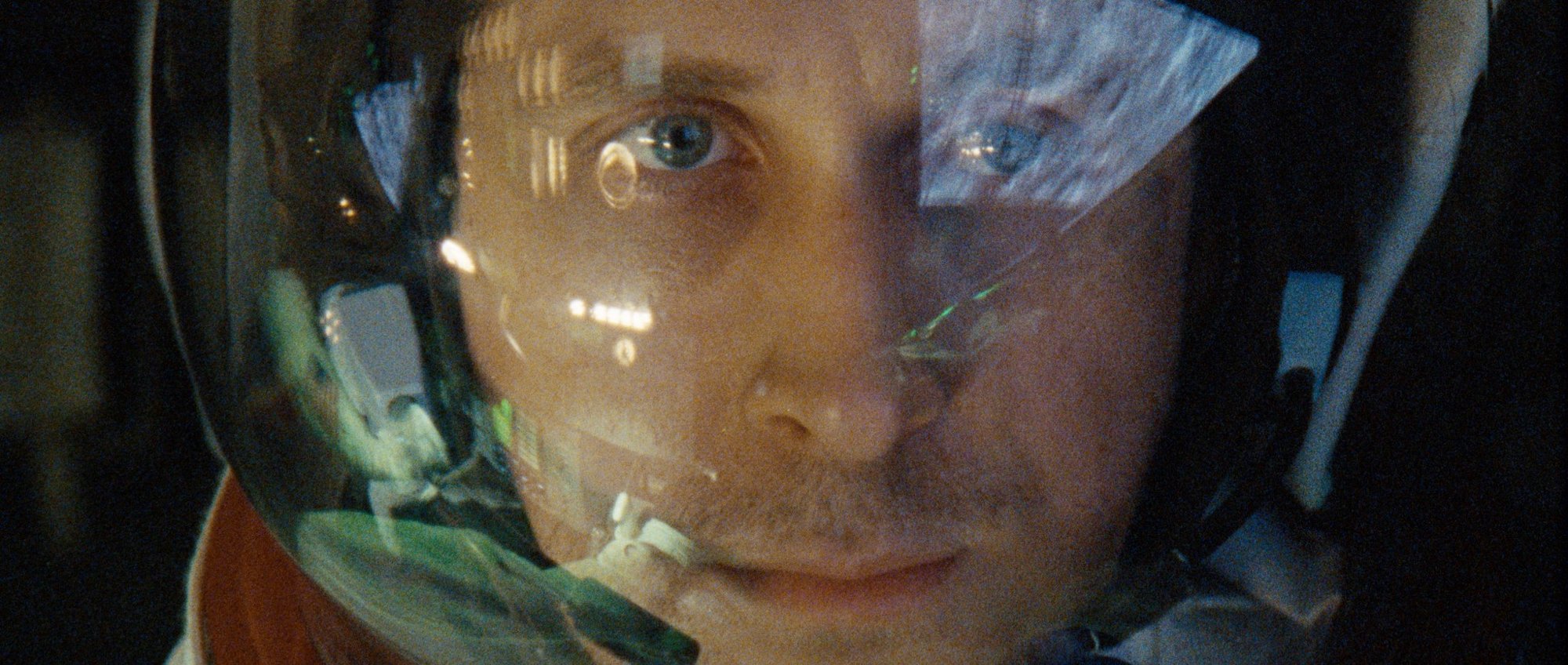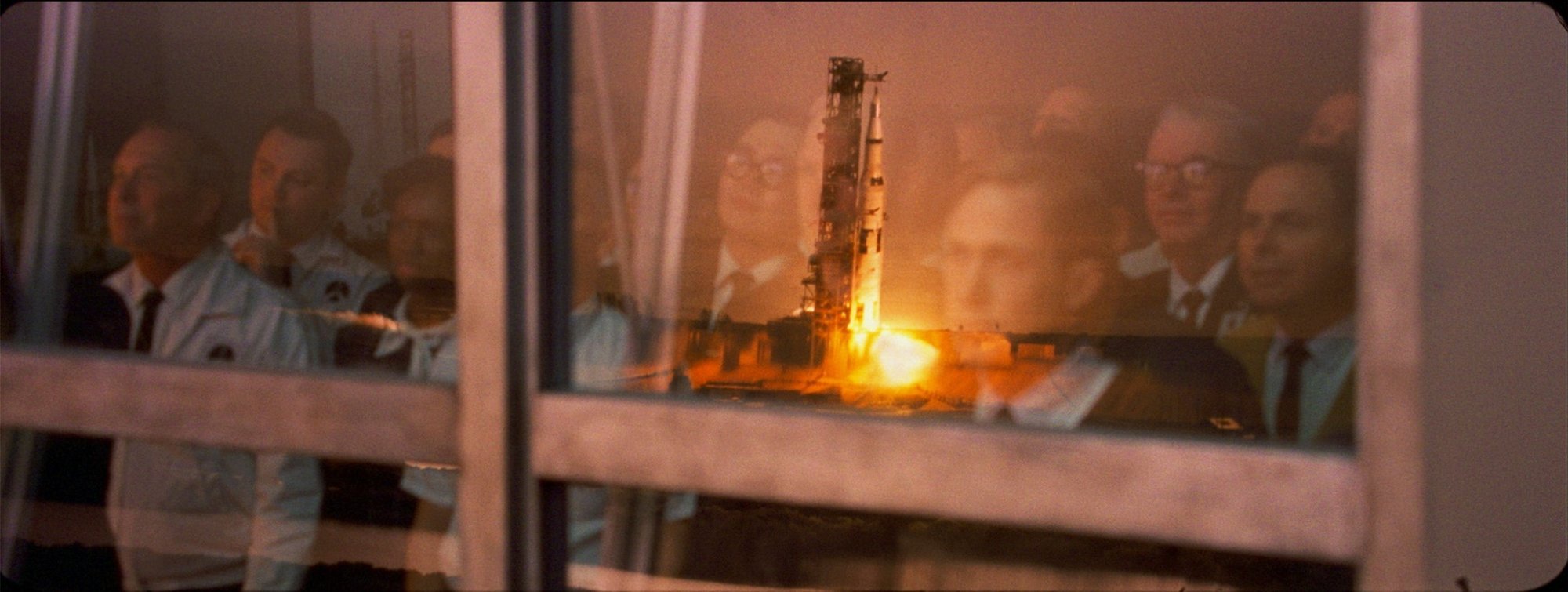FIRST MAN makes a beautiful, harrowing run for the Oscars.
By Matt Cummings
With SpaceX recently announcing the return of humans to the Moon, the discoveries of hundreds of exoplanets (including Planet X), and the revelation that water (and possibly life) exists on Mars, space has become popular again. Hollywood lately has done its share to reignite interest in space, celebrating to wide acclaim the remastered 50th anniversary of 2001: A SPACE ODYSSEY, while Hulu’s THE FIRST kept the human drama of preparing for a Mars mission focused mostly on the ground. The Neil Armstrong biopic FIRST MAN takes us to space in a completely new way, resulting in one of the most beautiful and harrowing movies of 2018.
THE MOVIE
When we first meet Neil Armstrong (Ryan Gosling), he’s just survived flying the then-experimental X-15 rocket/plane, nearly dying in the process but also becoming sub-orbital. His bosses don’t take too kindly to Armstrong’s handling of the situation, benching him while he fills out reports. All that changes when the shy, introverted test pilot applies to NASA’s Gemini program, which will send the first Americans into space. His dutiful wife Janet (Claire Foy) isn’t so impressed: she sees their marriage and the raising of their children being supplanted by Neil’s overwhelming desire to see space again. As Armstrong’s stock begins to rise, he and Janet will face challenges and tragedies at home, before Armstrong departs to place his soul (and foot) on our nearest neighbor in space.
If 2015’s THE MARTIAN represents the most “rock n’ roll” science-based space drama, then FIRST MAN represents the other side of that spectrum. This is a deep character biopic, thanks to Director Damien Chazelle’s insistence on keeping things centered on the human drama of venturing into space. Some will find that sort of silent resplendence a bit tedious (there’s a lot of talking and a ton of shaky close ups on our actors), until each of the massive and gorgeously-shot rocket scenes arrives to knock us back in our seats, then forward to the edge of them as Armstrong faces each life-defying challenge after challenge. Chazelle’s obsession on reproducing the technological awakening of the 1960’s is astounding, as we actually realize that the Gemini and Apollo space vehicles are essentially no thicker than tin cans, heaved to the top of massive rockets. This sort of fragility is a common theme in Chazelle’s movies, but here we know the stakes are much higher. To heighten that, cameras are placed so close to the actors that we can see pores, giving Foy a chance to communicate with her eyes. A particular scene sees her dressing down mission commander Deke Slayton (Kyle Chandler) as she demands that NASA turn back on the speaker connecting her to Neil. It paints a wonderful analogy, but it also demonstrates Foy’s ability to personalize the dangers which her husband doesn’t seem to realize. To him, the struggles that nearly kill him are merely problems to solve, but as we see with Apollo 8’s disaster – which claimed the lives of Gus Grissom (Shea Wigham), Roger Chaffee (Cory Michael Smith), and Ed White (Jason Clarke) – those dangers were real. That’s the theme of fragility coming back into play, but it also demonstrates just how masterful Armstrong was at taming those dangers.
Gosling, who essentially plays the human version of K from BLADE RUNNER 2049, also executes his role masterfully. He’s nervous and ill-placed around people and unsure how to raise his two boys and deal with his daughter’s terminal brain cancer, caught between the desire to slip gravity once more and unaware that he’s creating immeasurable amounts of stress at home. It’s a understated performance, but one that’s as effective as any we’ve seen in a mostly bereft 2018. Foy is great as well, reminding us that Space Wives (and that was a name given to them) also deal with the weight of their husband’s successes (and potential failures). One scene in particular sees Janet run to assist a fellow wife (Olivia Hamilton) as she contemplates a dark resolution after her husband dies in Apollo 8.
Chazelle and his support team also take us to dizzying heights that should look great on IMAX, focusing on in-cabin shots rather than the standard ‘god’s view’ imagery. Cinematographer Linus Sandgren and Composer Justin Hurwitz make such genius decisions in their respective areas that the final product might surpass the gold standard in this subgenre, 1983’s THE RIGHT STUFF. Thanks to Chazelle, it’s now entirely possible to watch both movies consecutively, which is exactly what I’ll do as I consider my conundrum. Some moviegoers will not engage with FIRST MAN at all, as several at our screening complained about its slow pace and abrupt ending; touche on the last argument, but I’ll bet that was in response to the stunning moon scenes which make up all of Act 3, as Armstrong chooses a new landing site at the last minute, steps on the lunar surface, utters his now famous “One small step” mantra, and leaves a special gift on the surface, all while we’re treated to a 2001-style breathing apparatus with no music. It’s a lot to do well, and Chazelle absolutely nails it.
THE BOTTOM LINE
FIRST MAN does exactly what a great biopic should, sharing new angles about its subject and inspiring you to start your own research to uncover this complex man and the many hurdles (including strong opposition to the enormous budgets) which almost ended the program before it got off the ground. Armstrong’s story is as eye-opening as the technical challenges he and others faced, and that creates a stirring mix of gorgeous visuals and truly harrowing moments. FIRST MAN reminds us that we’re about embark on the next chapter of our journey into space: visits to the Moon and Mars are upcoming, and it’s entirely possible that we will soon answer the question of life on other planets. These realities put us in a perfect place to move forward by looking back to the days of high heroism by Armstrong and others, who tested the limits of technology and bravery in an effort that benefited all of mankind. Take a chance on this Oscar shoe-in, and see if you don’t agree.
FIRST MAN is rated PG-13 for some thematic content involving peril, and brief strong language and has runtime of 141 minutes.






